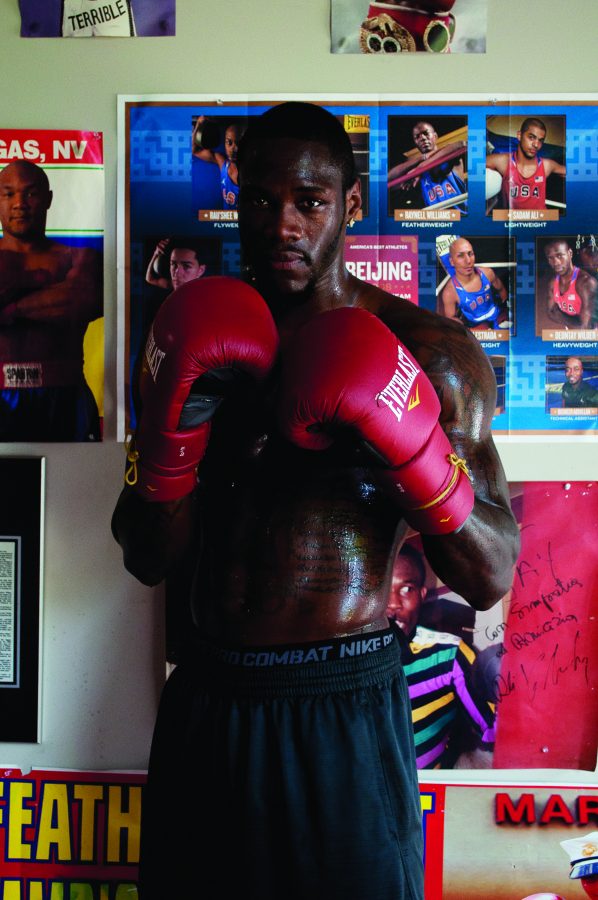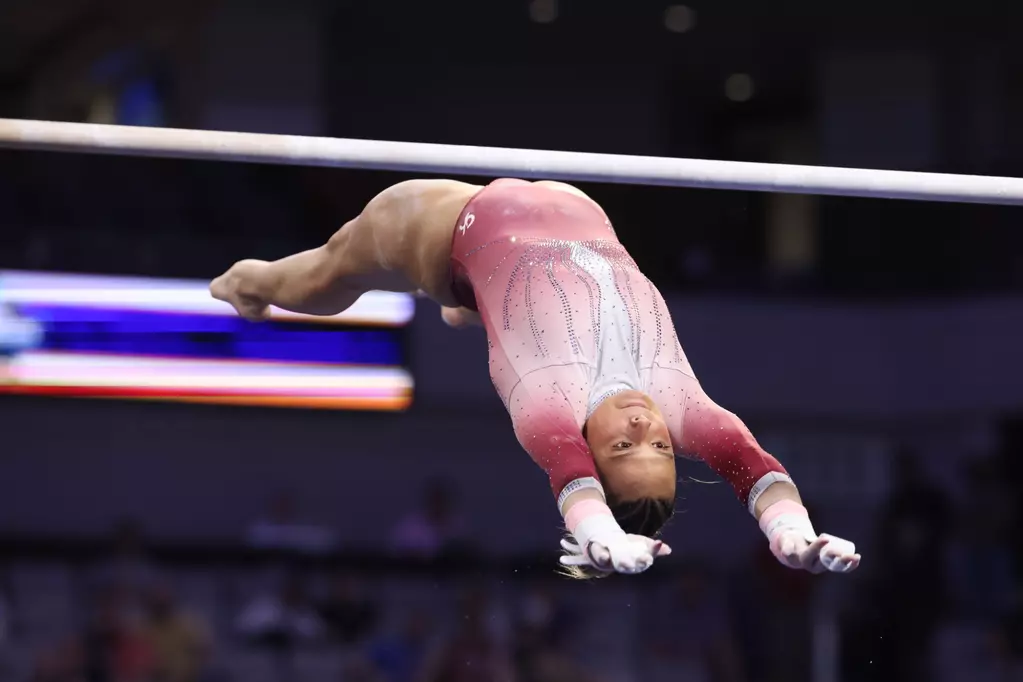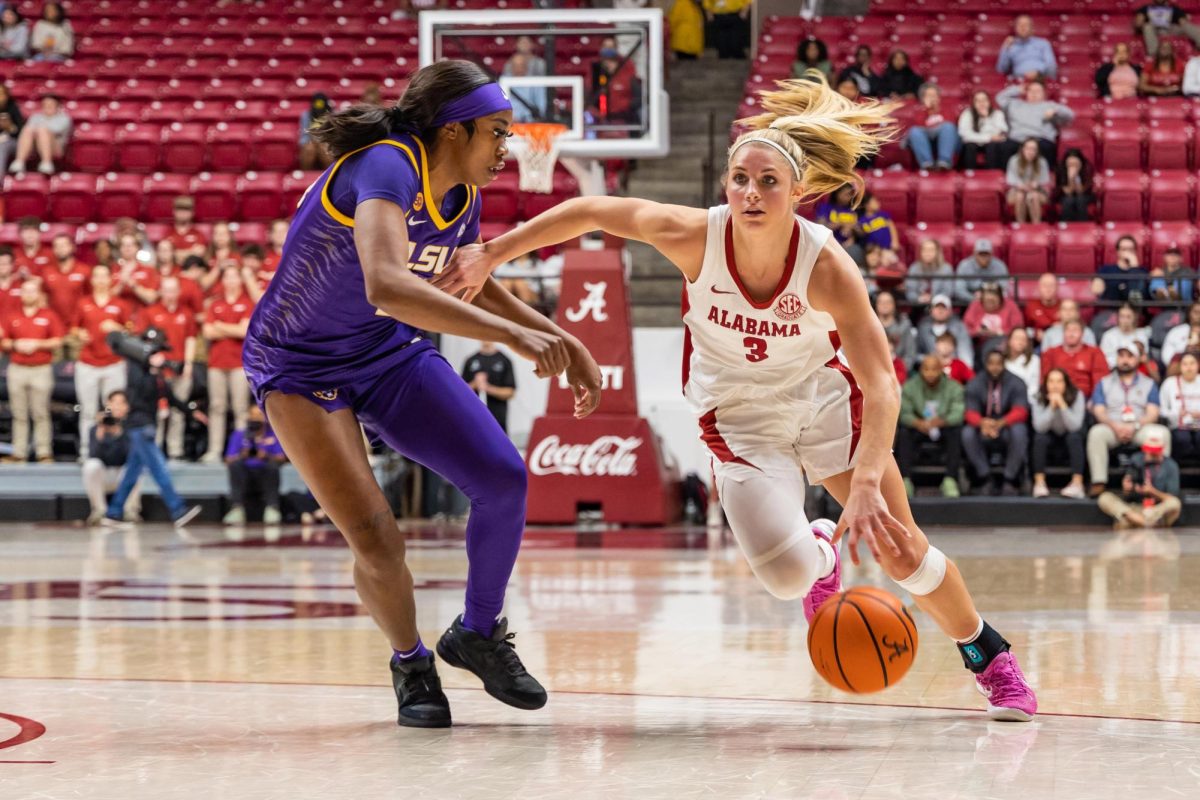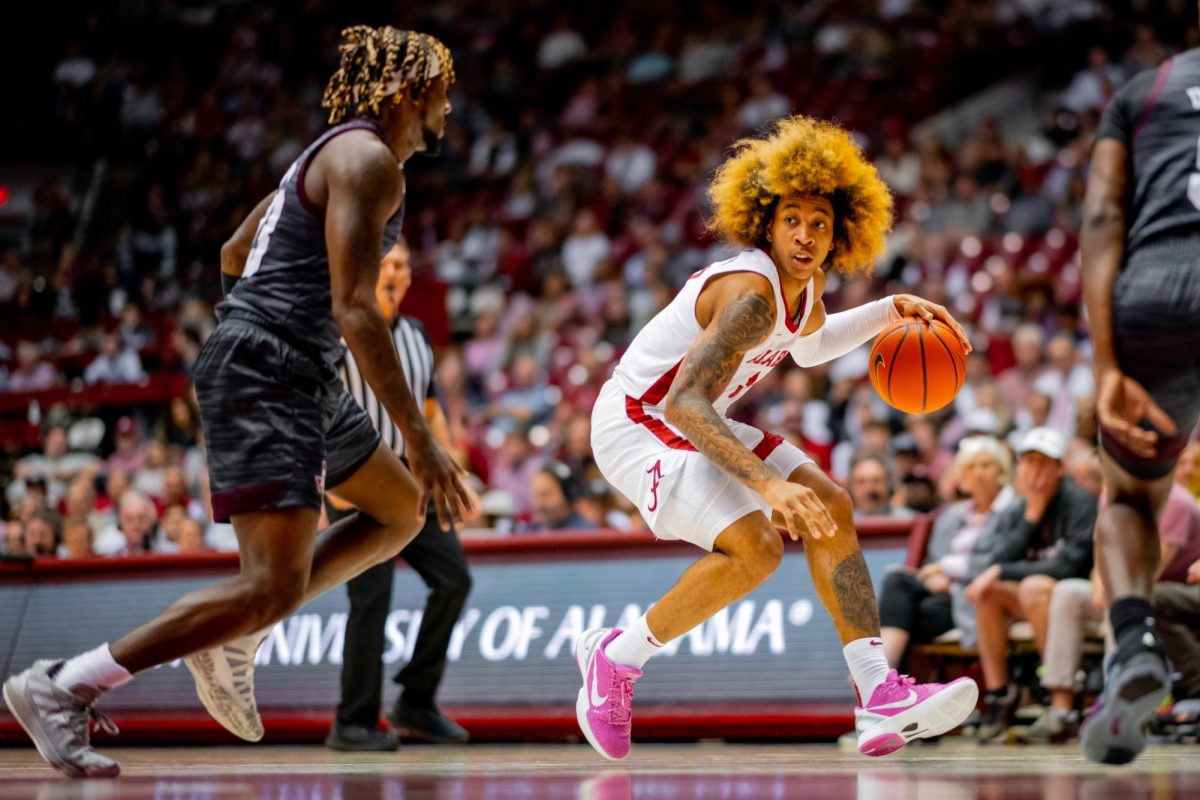“60 seconds!” Jay Deas shouts from inside a boxing gym in Northport, Ala. Heavyweight Deontay Wilder unleashes a flurry of punches at the heavy bag hanging from the ceiling. The first thing that stands out about Wilder is his height – at 6’7”, he towers over everyone watching, but seems to move with the grace and speed of a much smaller boxer.
Heavyweight Deontay Wilder unleashes a flurry of punches at the heavy bag hanging from the ceiling. The first thing that stands out about Wilder is his height – at 6’7”, he towers over everyone watching, but seems to move with the grace and speed of a much smaller boxer.
“40 seconds!” His left jabs fly like lightning, and his powerful right hook booms like thunder. “Oh, it’s over now.” Wilder taunts his imaginary opponent, circling the bag and striking it with a combination of jabs and hooks, ducking and dodging as it swings back at him.
A few seconds later, he starts to slow down – fifty seconds of continuously throwing punches is starting to take its toll.
It’s not an uncommon feeling for the Tuscaloosa native. Wilder is 22-0 in his professional career – all by knockout – and will look to make it 23-0 on Saturday night at the Killer Buzz Arena in McFarland Mall. The 26-year-old won two major national titles at the amateur level and was the only American to medal in boxing at the 2008 Summer Olympics.
His stock in professional boxing only rises with each knockout, and he dreams of being the first to bring the heavyweight championship belt to Tuscaloosa and the state of Alabama. The journey that led Wilder to this Northport gym on a sunny June afternoon began long before he ever set foot in a boxing ring, though.
“I never looked for trouble, but trouble always found me.” -Wilder
He wasn’t always the giant he is today. He was just a “little kid,” as he called himself, growing up at Stillman Heights Elementary School.
Wilder didn’t have any interest in boxing, but he also never backed down from a fight. As one of the smaller kids in his class, he was an easy target for his classmates.
“I guess because I was smaller – I wasn’t always tall – everyone wanted to pick with me,” he said. Like every kid growing up in Tuscaloosa, he dreamed of playing for the Crimson Tide. Wilder always found himself throwing the football around or hanging out at the local basketball court, which was packed every night.
“You get that big tradition thing, see all the games, all the people coming into town,” he said. “You see them on TV, you’re like, ‘Wow, I want to play for them one day.’”
As he grew older, he grew in athleticism and was one of the best athletes in his grade. However, after graduating from Central High School in 2004, his grades forced him to attend Shelton State Community College, where he walked onto the basketball team.
Before his basketball career could begin, though, his life took a sudden turn and would be changed forever.
“Sometimes, we have plans for ourselves, but God has other plans for us.” -Wilder
Deontay Wilder sat in a hospital room with his girlfriend at the time, Jessica. She was pregnant, and the doctors had diagnosed their unborn child with spina bifida – they said she would never walk. Having the child would significantly limit what Deontay and Jessica could do, as taking care of a child with that condition would require an immense amount of attention and care. There was another alternative, the doctor said – one that would allow the two of them to live the rest of their lives just like they had planned.
Deontay looked at the doctor, then to Jessica.
“No, thank you,” he said at the time. “We’re not going to terminate it.”
“We accepted that challenge that day,” he said. “I never think a child is a mistake, especially if you’re not planning on it, if you do it out of wedlock. Every person, no matter what their disorder is, deserves a chance in life.”
Wilder never saw the basketball court at Shelton, one he surely would have dominated for four years, but he wouldn’t have it any other way. He and Jessica are happily married, and Naieya is six years old. She has defied all of the doctors’ expectations, walking with the aid of leg braces and sometimes without them when she is at home. She smiles, laughs and lights up her dad’s face every time he talks about her.
What started out as a setback to a promising career turned into more than Wilder ever could have expected.
“God blessed me with even more,” he said. “When you make the right decision in life, that’s a great feeling.”
“He just walked in the door one day.” -Deas
Playing basketball was no longer an option, and Wilder needed a way to support his new family. He was driving a beer truck at the time when a friend mentioned boxing, just in passing. Having been a good street fighter growing up, Wilder decided to investigate. He showed up at the door of Jay Deas, his current trainer, who ran a gym in
He looked around, and his eyes lit up.
“It’s like a kid seeing Christmas for the first time and not knowing what to expect, but then opening up the present,” he said.
He started training with Deas, who eventually gave him some things to work on by himself.
“That’s usually when you’ll see guys not do as much,” Deas said. “But he was the opposite. He actually did as much or more than when he didn’t think I was watching. And I said, ‘This may be something special here.’”
After only a few months of training, Deas got Wilder his first fight in January of 2006. From there, he started competing in Golden Glove competition, eventually winning the heavyweight championship in October of 2007.
He qualified for the Summer Olympics in 2008, where he was the only medalist for the USA in boxing, taking home the bronze.
“The greatest feeling about it is coming out of the opening ceremony … and you’re coming out like, ‘I’m glad I’m from the USA.’ I’ve been to other countries, and there ain’t no other country you want to be from than the USA,” he said. “If I could’ve fought that night, you’re looking at the gold medalist right there.”
Wilder made his professional debut on Nov. 11, defeating Ethan Cox in a two-round TKO and never looked back. Twenty-one professional bouts later, Wilder is still undefeated, knocking out every opponent he’s faced. But of all his fights, there is one that will stay with him for the rest of his life.
“Any boxer that’s a boxer professional-wise here in the state of Alabama, I think that was their day.” -Wilder
Alabama didn’t have a professional boxing commission, so Wilder always found himself traveling for fights. But after he returned from the Olympics, he made it his mission to lobby for one. Finally, in July of 2009, then-governor Bob Riley signed the commission in the law, and on a February night in 2011, Wilder made history.
Fans packed the Umphrey Center at Shelton State on Feb. 19, 2011 to witness the first professional boxing match in the state’s history and to see their hometown hero, Deontay Wilder. He knocked out DeAndrey Abron in the second round of the main event, but the night was a victory for all boxers in the state of Alabama.
“After that very first show, it was like, ‘It’s on.’ I’m definitely fixing to put Alabama on the map in this boxing thing,” Wilder said.
Afterwards, people from all over the state called him to thank him for everything he had done. Now, kids could train in Alabama and not have to move to another state to pursue a boxing career.
“There’s no greater feeling than right here at home, where your people are,” he said.
“My goal is to be the next heavyweight champ of the world, and I’m definitely going to be that.” -Wilder
“5 seconds, championship!” Back in his Northport gym, Deontay Wilder steps back, takes a deep breath, then lands seven quick, powerful blows before time is called on the workout and he can rest.
The jury is still out on Wilder’s professional potential. ESPN.com called Wilder one of the top US heavyweight prospects, while others say he hasn’t faced strong enough competition to be mentioned in that group. Wilder’s goals are clear, and if his life is any indication, he won’t settle for anything less.
“I’m the type of person that if you doubt me, I’m going to prove you wrong,” he says. “It never fails, because that’s what’s going to make me work the hardest.”
He didn’t let grades, an unexpected daughter or a boxing commission bring him down, and even if his rise takes some time, he won’t be going anywhere anytime soon.
“The hard thing about being a human is having patience,” he said. “We always give up so early. And we might be at the tip of success – we can be right there at the door – but it gets hard, we give up, and then we never know.”









